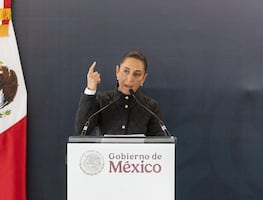Más Información

Óscar Rentería Schazarino, ha operado contra CJNG, Viagras y Templarios; es el nuevo secretario de Seguridad en Sinaloa

Claudia Sheinbaum pide respeto para Maru Campos; gobernadora anuncia acuerdo para transporte público

Claudia Sheinbaum anuncia los Centros de Cuidado Infantil en Chihuahua; inaugura hospital en Ciudad Juárez

T-MEC no se debe concebir como un subsidio para México, afirma Sheinbaum; tratado aumentó 48% el comercio desde 2020
In the Mexican political system, parties receive loads of public resources to carry out their everyday activities and electoral promotion. The Mexican Constitution stipulates that the public funding must prevail over the private support. One of the reasons is that this way there wouldn’t be any risk of “dirty” money reaching politics.
Regardless of this, it’s common that the National Electoral Institute (INE) issues fines to all parties for crossing their established spending limits. Where do all these resources to overspend come from?
In the last few days, EL UNIVERSAL has spread information and videos that show a couple of times a virtual candidate to Mayor receiving thousands of pesos as contributions “to the party”. And, in another video, that same person – in her quality of local deputy – receives one million pesos for helping the State Congress adopt a law “suitable” for the donor.
Both cases constitute illegal acts. In the case of private funding, there are regulations that must be complied and, in the second case, we are talking about a misuse of the public charge. This last case makes it clear that it’s necessary to regulate the lobbying issue. There’s a register for “promoters of causes” in the Federal Congress, but there are no proper regulations for them as of yet. There’s a crucial need to establish limits to this practice at a state level as well. Even though it’s still unknown if that money reached the very party, the videos shown must serve as an alert of an illegal act that seems to be happening more frequently than we thought. The arrival of private money – outside the boundaries of legality – to parties or electoral campaigns implies a virtual commitment of candidates or political groups to specific interests of a certain group and not to the general well-being.
Parties represent a load of thousands of millions of pesos to the annual budget. Nevertheless, it's clear that many legislators and candidates are willing to accept economic support from groups outside the law. In case any of these politicians happen to reach the position they are running for, they will have an important dilemma, who to answer to? To those who destined millions to their campaigns or to the citizens who put them there with their vote? In theory, they answer to two masters, and as we commonly say in Mexico, they will fail one of them.
Next year there will be a renewal of charges in all sectors of Mexico´s government, including the President. Temptations to influence parties and candidates will surely arise. But authorities are still on time to send an ultimate message now.
al






